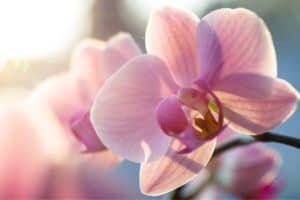Are orchids hard to take care of? This is a common question among plant enthusiasts who are considering adding these beautiful flowers to their collection. While orchids have a reputation for being delicate and difficult to care for, with the right knowledge and techniques, you can successfully grow and maintain these stunning plants. In this article, we will explore the ins and outs of orchid care, providing you with valuable tips and insights to ensure your orchids thrive.
Understanding Orchids: A Brief Overview
Before we delve into the specifics of orchid care, let’s take a moment to understand these fascinating plants. Orchids belong to the Orchidaceae family, which is one of the largest families of flowering plants. With over 28,000 known species, orchids come in a wide variety of shapes, sizes, and colors. They are known for their exotic beauty and are often associated with elegance and luxury.
Choosing the Right Orchid for You
When it comes to orchid care, selecting the right orchid for your environment is crucial. Different orchid species have different care requirements, so it’s important to choose one that suits your lifestyle and the conditions in your home. Here are a few popular orchid varieties and their care needs:
- Phalaenopsis Orchids: These are one of the most common types of orchids found in homes. They are known for their long-lasting blooms and are relatively easy to care for. Phalaenopsis orchids prefer bright, indirect light and should be watered when the top inch of their potting mix feels dry.
- Cattleya Orchids: Cattleya orchids are known for their vibrant and fragrant flowers. They require bright, indirect light and should be watered when their potting mix is almost dry. Cattleya orchids also benefit from a period of cooler temperatures to encourage blooming.
- Dendrobium Orchids: Dendrobium orchids come in a variety of colors and sizes. They prefer bright, indirect light and should be watered when their potting mix is dry. Dendrobium orchids also require a period of cooler temperatures to initiate blooming.
Essential Orchid Care Tips
Now that you have chosen the right orchid for your home, let’s dive into some essential care tips to ensure your orchid thrives:
1. Light
Orchids require bright, indirect light to grow and bloom. Placing your orchid near a north or east-facing window is ideal. Avoid exposing your orchid to direct sunlight, as this can scorch the leaves. If you notice that your orchid’s leaves are turning yellow or developing brown spots, it may be receiving too much light.
2. Watering
Proper watering is crucial for orchid care. Overwatering can lead to root rot, while underwatering can cause the orchid to dry out. The best way to water your orchid is to thoroughly soak the potting mix and allow it to dry out slightly before watering again. It’s important to note that orchids should never sit in standing water, as this can lead to root rot.
3. Humidity
Orchids thrive in humid environments. If the air in your home is dry, you can increase humidity around your orchid by placing a tray filled with water and pebbles beneath the pot. As the water evaporates, it will create a more humid microclimate around the plant.
4. Temperature
Orchids have specific temperature requirements for optimal growth and blooming. Most orchids prefer temperatures between 60°F and 80°F during the day and slightly cooler temperatures at night. However, it’s important to research the specific temperature preferences of your orchid species, as some may have different requirements.
5. Fertilization
Fertilizing your orchid is essential for providing it with the nutrients it needs to thrive. Use a balanced orchid fertilizer and follow the instructions on the packaging for proper application. It’s important not to over-fertilize, as this can damage the roots and lead to nutrient burn.
FAQs on “Are Orchids Hard to Take Care Of”
Q: Are orchids difficult to grow?
A: While orchids have a reputation for being difficult to grow, they can be successfully cared for with the right knowledge and techniques. Understanding the specific care requirements of your orchid species is key to ensuring its health and longevity.
Q: How often should I water my orchid?
A: Orchids should be watered when the top inch of their potting mix feels dry. It’s important not to overwater, as this can lead to root rot. Thoroughly soak the potting mix and allow it to dry out slightly before watering again.
Q: Do orchids need special pots or potting mix?
A: Orchids require pots with good drainage to prevent waterlogged roots. Special orchid pots with slits or holes are recommended. As for potting mix, orchids prefer a well-draining mix that allows air to circulate around the roots. Orchid-specific potting mixes, such as those made with bark or sphagnum moss, are commonly used.
Q: How long do orchids typically bloom?
A: The duration of orchid blooms varies depending on the species and environmental conditions. Some orchids may bloom for a few weeks, while others can bloom for several months. With proper care, you can extend the blooming period of your orchid.
Q: Can I grow orchids indoors?
A: Yes, orchids can be grown indoors successfully. However, it’s important to provide them with the right conditions, including proper lighting, humidity, and temperature. Choosing orchid species that are well-suited for indoor growing is also important.
Conclusion
Are orchids hard to take care of? With the right knowledge and techniques, orchid care can be a rewarding and enjoyable experience. By understanding the specific needs of your orchid species and providing it with the right conditions, you can watch your orchid thrive and bloom. So go ahead, give orchid care a try, and enjoy the beauty and elegance these stunning flowers bring to your home.
Fun Fact: Did you know that orchids have been around for millions of years? Fossil evidence suggests that orchids existed during the time of the dinosaurs, making them one of the oldest flowering plant families on Earth.
Originally posted 2023-09-20 11:28:41.



